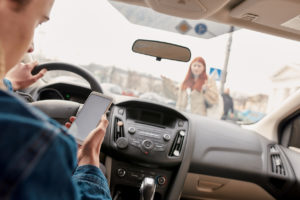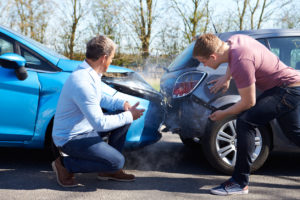Key Points:
- Dangers of Mobile Phone Usage While Driving: Emphasizes the critical safety risks associated with using mobile phones for any purpose while driving, likened to operating a vehicle blindfolded. This serves as a cautionary highlight for drivers about the potential consequences of distracted driving.
- Persistence of Texting and Driving as a Safety Issue: Acknowledges the continued prevalence of texting and driving in Georgia and nationally, despite ongoing efforts to address the problem. This point underlines the necessity for both legal enforcement and public education to combat distracted driving effectively.
- Legal Framework and Penalties for Distracted Driving in Georgia: Outlines Georgia’s comprehensive laws against using handheld devices while driving, part of the state’s hands-free initiative. This includes a summary of the legal penalties for non-compliance, aimed at reinforcing the importance of adhering to these laws for all road users’ safety.
When other drivers on the road divert their attention to their phones, it’s as though they’re navigating through traffic with a blindfold on. Each glance down to tap or swipe transforms their vehicle into an unpredictable hazard, moving at high speeds yet guided without full attention. Imagine a car speeding at 55 mph, its driver’s eyes off the road for just 5 seconds—it’s essentially moving blind for the length of a football field. This dangerous multitasking delays their reaction to sudden stops, pedestrians, or changes in traffic flow, vastly increasing the risk of collisions. Beyond the immediate danger, these distracted drivers face severe legal consequences, from fines to license points, reflecting the seriousness of their actions. In short, when drivers engage with their phones instead of the road, they gamble not just with their own safety, but with the lives of everyone around them, making every trip a risky venture.
Is Texting and Driving Still an Ongoing Problem?
Texting and driving is not new to Georgia. This has been a problem that’s been ongoing for the past two decades. The statistics on texting and driving in America reveal that people are still texting or emailing while driving. According to a survey by the AAA Foundation, 52% of US respondents reported talking on a hand-held phone while driving in the last 30 days, and over four in ten admitted to reading an email or text while on the road. More alarmingly, more than three in ten respondents confessed to sending an email or text while behind the wheel. These are not great numbers, if 30-40% of drivers are distracted by their smartphone on the road, we are not close to solving this problem.
Is it Against the Law to Text and Drive in Georgia?
In Georgia, it’s against the law for any driver to write, send, or read text messages while operating a vehicle, as stated in O.C.G.A. 40-6-241. This prohibition extends to browsing the internet, watching videos, or engaging in any form of electronic communication while driving. Excuses such as merely “checking the internet” briefly are not valid defenses. If you were involved in an accident caused by a driver who was texting or using the internet, you might have grounds for a negligence claim due to distracted driving. Although Georgia law has not explicitly recognized the right to seek punitive damages for accidents caused by texting while driving, we strongly believe that such behavior is both negligent and reckless.
What Does it Mean That Georgia is a “Hands Free State”?
Georgia’s designation as a “Hands-Free State” means strict laws are in place to limit the use of handheld devices while driving. This legislation prohibits drivers from holding or using their bodies to support a phone or electronic device, aiming to diminish distractions by ensuring drivers’ hands remain free to control the vehicle. Activities such as writing, sending, or reading text-based communications, watching or recording videos (except for GPS navigation and dash cams), and manually operating the device for any purpose are banned while driving.
However, the law permits the use of hands-free technologies, including Bluetooth earpieces, wireless headsets, and voice-to-text features, enabling drivers to communicate without physically interacting with their devices. This approach seeks to enhance road safety by reducing the risk of accidents linked to distracted driving, with penalties for violations including fines and points on the driver’s license, underscoring the importance of compliance for the wellbeing of all road users.
If a Driver’s Distraction From Using a Smartphone Leads to a Car Accident, Would It Be Classified as Reckless Driving?
Reckless driving in Georgia is defined as driving with a reckless disregard for the safety of persons or property. If an individual is found to be texting while driving and causes an accident, this action could indeed be interpreted as reckless behavior because it demonstrates a clear disregard for the safety of others. In such cases, the offending driver could face charges that carry more severe penalties than those for a simple violation of the hands-free law, including fines, points on their license, and potentially even jail time, depending on the circumstances and severity of the offense.
Are All Car Accidents Caused by Texting Classified as Reckless Driving?
Not all are considered reckless.
In Georgia, the classification of a car accident as reckless driving due to texting hinges on the specifics of the incident. Texting while driving, illegal per Georgia law, is a form of distracted driving but does not automatically escalate to reckless driving. The determination depends on the context of each case.
A brief glance at a phone resulting in a minor collision, like a fender bender with little to no injuries, typically does not qualify as reckless driving. Such incidents are seen as less severe due to the minimal risk posed.
Conversely, reckless driving charges related to texting usually require proof of significantly dangerous behavior or a blatant disregard for the safety of others. This might involve scenarios where the driver was speeding excessively, navigating traffic unsafely, or ignoring traffic signals while texting. For example, causing a severe accident while texting at high speeds could likely be considered reckless, especially if it results in serious injuries.
The assessment of whether texting contributed to reckless driving is made on a case-by-case basis, considering factors like driving speed, traffic conditions, and the driver’s actions before the accident. Legal experts play a crucial role in navigating these complexities, providing tailored advice based on the available evidence and the accident’s specifics.
What Legal Penalties Could a Driver Face for Causing an Accident While Texting?
In Georgia, drivers involved in accidents while texting and driving may encounter a spectrum of legal repercussions, categorized as distracted driving violations. Penalties can range from citations for using handheld devices while driving — a breach of Georgia Code Section 40-6-241.2 — to more severe charges depending on the accident’s severity and the evidence of distraction. The outcome could vary from a minor fine for a traffic citation to charges of vehicular homicide in the event of a fatal crash, reflecting the seriousness of the distraction and its consequences.
How Can You Determine at the Scene of an Accident if the Other Drivers Smartphone Distraction Resulted in the Car Accident?
If you’re unharmed at the scene of an accident, there are proactive measures you can take to bolster your legal case, especially if you suspect the crash was due to the other driver being distracted by a smartphone. These early actions can be pivotal in establishing the cause of the accident. These tactics include:
- Directly inquire with the other driver, particularly the one at fault, about whether they were using their phone just before the collision occurred.
- When police officers arrive at the scene, request that they question the other driver regarding the potential role of smartphone usage in the accident.
- Observe the other driver’s behavior with their smartphone closely. If they appear to be constantly on their phone post-accident, it could be a significant indicator of distraction.
- Engage any passengers or bystanders present at the scene to see if they witnessed the driver using their phone during the incident.
- If the other driver denies phone distraction, ask them to clarify what distracted them instead, and assess the plausibility of this alternate distraction.
If these strategies successfully reveal that the accident was caused by smartphone-induced distraction, it’s crucial to ensure this evidence is formally recorded.
How Does a Car Accident Lawyer Show That the Driver At-Fault Was Texting or Distracted by Their Phone?
When accidents occur due to texting drivers who deny using their phones, our attorneys employ various strategies to build a strong case:
- Obtain the Driver’s Cell Phone Records: We can subpoena the at-fault driver’s phone records to uncover evidence of phone use during the crash.
- Issue a Preservation of Evidence Letter: This is sent to both the at-fault driver and their insurance company, demanding the preservation of the cell phone and its data.
- Secure Video Evidence: We request footage from security cameras at the intersection or from nearby businesses that might have recorded the accident.
- Witness Testimonies: By interviewing or subpoenaing witnesses, we aim to find someone who saw the driver texting or distracted just before the accident.
- Inspect the At-Fault Vehicle: An examination of the other driver’s vehicle may reveal clues about their actions at the time of the crash.
- Download Electronic Data from the Vehicle: Analyzing data like brake application or steering activity can indicate if the driver was distracted.
- Depose the Other Driver: Taking the deposition of the at-fault driver under oath can help uncover the truth about their phone use.
- Analyze Call and Data Logs: We use these logs to establish that the driver was on the phone at the time of the accident.
- Investigate All Phones in the Driver’s Household: By obtaining records and bills for all cell phones in the household, we can further support our case.
These methods collectively help counter false denials and prove smartphone distraction in car accident cases.
What Are Challenges That Car Accident Lawyers Experience When Trying to Prove Texting and Driving?
Car accident lawyers do not have an easy job when it comes to proving distracted driving. These are some of the challenges they face when trying to prove that the at-fault driver was texting:
- Direct Evidence Scarcity: Hard to find proof of texting right before the crash.
- Privacy Laws: Legal hurdles in accessing phone records due to privacy protections.
- Driver Denial/Lies: At-fault drivers often deny phone use, complicating evidence collection.
- Witness Issues: Witness accounts may be unreliable or challenged for accuracy.
- Technical Challenges: Difficult to prove the texting activity specifics with phone company data.
- Data Retrieval: Getting detailed data from cell companies can be slow and complex.
Is a Higher Compensation Amount Rewarded in a Settlement if a Smartphone Distraction Caused the Car Accident?
In Georgia, when a car accident is caused by smartphone distraction, the potential for receiving higher compensation in a settlement is indeed influenced by the state’s comparative fault laws and the categorization of such behavior as reckless driving. Georgia operates under a modified comparative fault system, which means that the compensation a plaintiff can receive is reduced by their percentage of fault, provided they are found to be less than 50% responsible for the accident. Therefore, if the at-fault driver was distracted by a smartphone, this can solidify their fault percentage, potentially increasing the compensation awarded to the victim.
Moreover, given the widespread public awareness campaigns and efforts to curb texting and driving, such behavior can be viewed as not only negligent but reckless. This distinction is crucial because, in Georgia, if the at-fault party’s actions are deemed reckless, it opens the door for punitive damages. Punitive damages are designed to punish the defendant for egregious behavior and deter similar conduct in the future. Therefore, in cases where smartphone distraction is a factor, the argument for punitive damages becomes stronger, potentially increasing the overall compensation awarded in the settlement.

 1201 West Peachtree Street #2339 Atlanta, GA 30309+1-770-212-3795$0-$100000
1201 West Peachtree Street #2339 Atlanta, GA 30309+1-770-212-3795$0-$100000Not only is this law firm staffed with highly educated professional lawyers it is also a law firm that gives back to the community. This philanthropic firm runs towards help with an extended hand and that is refreshing to witness.

- National Highway Traffic Safety Administration: Distraction.gov – Facts and Statistics
- Governors Highway Traffic Safety Association – Distracted Driving














